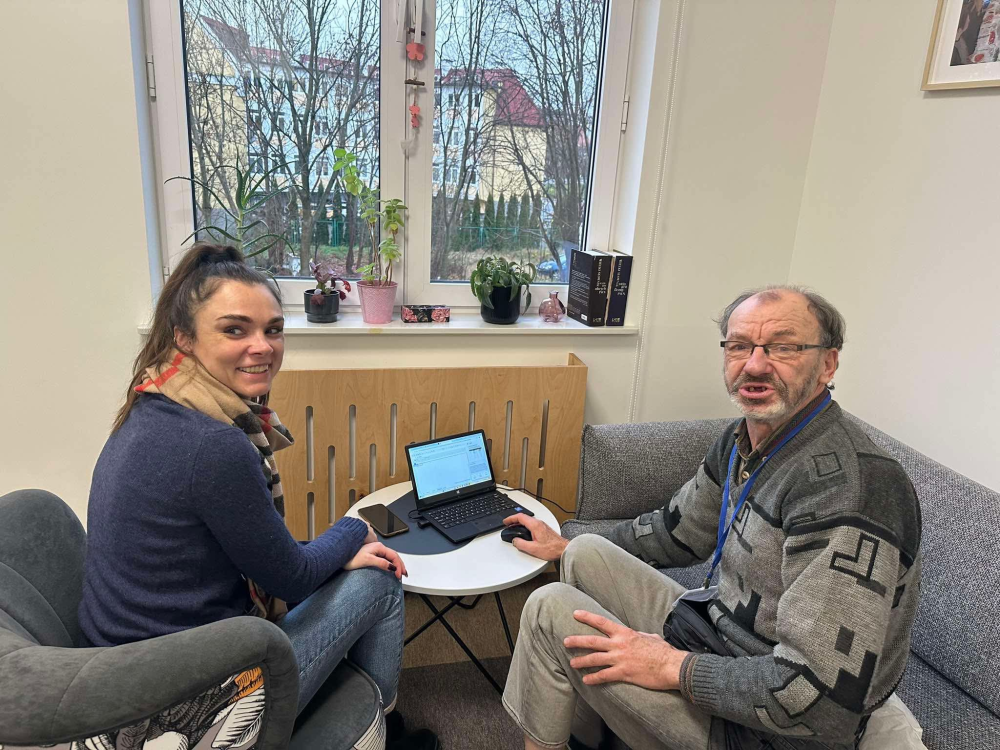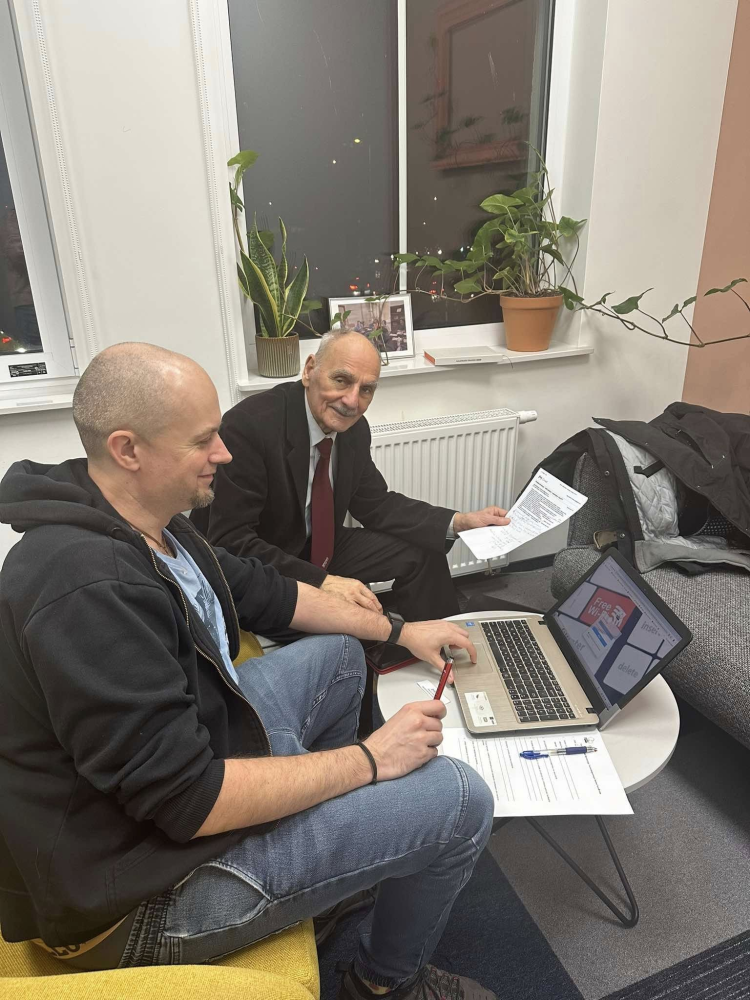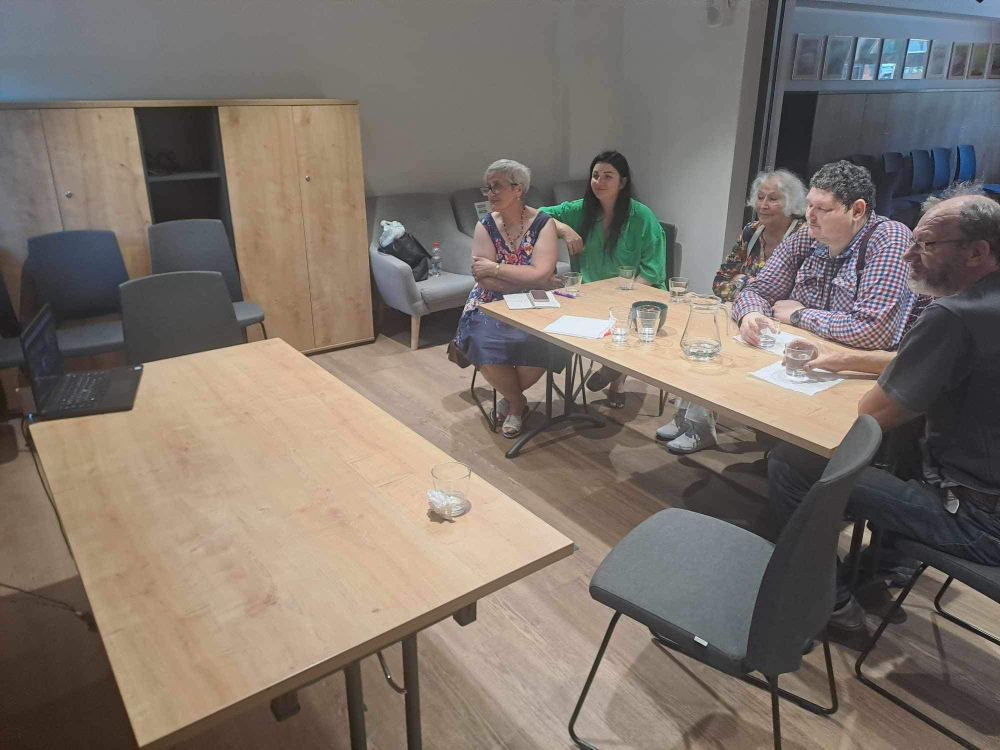According to Eurostat data from 2023, only 28% of people aged 65–74 in the European Union have basic digital skills, compared to 70% among the younger group aged 16–24. This digital gap limits opportunities for many seniors, who often feel left out of the modern world.
In response, the Gościnna Przystań Neighborhood House launched the Senior Tech-Minds program — one-on-one digital mentoring for older adults from Poland and Ukraine. This project grew from a long-standing partnership between the Gdańsk Social Innovation Foundation (GFIS) and PwC, whose employees volunteer their time to support the program. This cross-sector initiative is a great example of how business, NGOs, and local communities can join forces to make a real difference in people’s lives.
Glossary:
Employee volunteering – how companies blend business with helping others. Employees get involved in social causes, supported by their employers, doing good together.
Cross-sector initiative – cooperation between representatives from different fields, like business, social organizations, and public administration, working together to tackle important social challenges.
From Identifying Needs to Real Change
The Senior Tech-Minds program began with a careful look at what seniors and volunteers needed. Together with PwC partners, we conducted surveys and interviews that also served as recruitment for the program. Seniors wanted help with using smartphones, messaging apps, online banking, and handling official matters digitally. Many spoke about staying in touch with family at a distance and how technology could become a support, not a barrier. Volunteers expressed a genuine wish to “help those who really need it,” to build meaningful connections with older adults, and to gain new experiences in offering support. This natural drive to help laid the solid foundation for the project.
From there, mentoring pairs were formed, matching seniors’ needs with volunteers’ willingness to help. Volunteers took part in brief training, learning about adult education principles and the local senior community’s specific needs. This helped build relationships based on trust and patience — key ingredients for successful mentoring.
 Photo: Senior Tech-Minds participants working together (GFIS).
Photo: Senior Tech-Minds participants working together (GFIS).
Challenges to Navigate in Cross-Cultural Mentoring Collaboration
During the implementation of the Senior Tech-Minds program, we encountered a range of challenges that required careful attention and flexibility.
Educational concerns - one of the main concerns among seniors, especially those whose educational experience was long ago, was anxiety about engaging with new technologies. Therefore, we dedicated considerable time to explanations and provided informational materials to alleviate doubts and build a sense of security.
Respect and dignity - some of the participants perceived the casual attire of volunteers, such as hoodies and sweatpants, as a sign of disrespect. This required open dialogue and mutual awareness-raising among both volunteers and seniors about cultural differences and social norms.
Gender roles—some seniors found it difficult to accept that a woman could be a programmer or digital mentor. In such cases, we explained, demonstrated volunteers’ competencies, and matched mentoring pairs with attention to the individual needs and preferences of participants.
Managing expectations - sometimes, seniors expected volunteers to perform tasks for them, such as making bank transfers, rather than supporting them to be independent. In these moments, we relied on the support of an animator who reminded participants of the program’s goals and encouraged active involvement.
Timetable - some participants cancelled or rescheduled sessions without informing us, which complicated monitoring progress and organizing meetings. We maintained regular contact with participants, sending reminders and requesting feedback.
Digital security - working with computers involves handling sensitive passwords and personal data, so we paid special attention to educating both seniors and volunteers about security principles, introducing clear guidelines and procedures to ensure safe technology use.
These challenges taught us the importance of individualized approaches, patience, and open communication in building effective and respectful mentoring relationships.
Digital Mentoring – Why and How?
Glossary
Mentoring is a developmental process built on a close, personal relationship between a more experienced guide and a learner (mentee). The key to mentoring is tailoring support to the mentee’s unique needs and goals, fostering trust, open communication, and lasting learning outcomes.
In our program, digital mentoring is a special exchange — volunteers (digital mentors) share tech know-how, while seniors (mentees) offer life experience, creating a relationship full of mutual respect and understanding. The mentee sets the learning goals, deciding what digital skills they want to develop. The mentor adjusts the pace and scope accordingly, making each meeting effective and engaging.
Glossary:
Mentor – an experienced person who shares knowledge, supports, and advises.
Mentee – a learner who grows through the mentor’s guidance and experience.
Mentoring sessions happen in pairs, allowing for personalized attention in a calm, friendly atmosphere. Every meeting is carefully documented—we record what was learned and plan the next topic. This routine helps track progress and quickly address any challenges. A project animator from the Neighborhood House supports the process.
Mentors use various methods: step-by-step demonstrations, live explanations, problem-solving together, and encouraging seniors to try things on their own. Building confidence is just as important—every small success is celebrated, boosting motivation. Emotional and cultural context matter too. Mentors pay attention to mentees’ feelings and concerns, adapting communication styles accordingly. This helps break down stereotypes and barriers that often block learning new technologies.
The program usually includes about 5–7 mentoring sessions. Midway, there’s a progress check to review results and adjust the learning plan if needed. At the end, successes are celebrated—seniors and mentors share stories showing how technology stopped being a barrier and became a bridge to a fuller, active life.
 Photo: One of the mentoring sessions (GFIS).
Photo: One of the mentoring sessions (GFIS).
Employee Volunteering – Driving Real Social Change
A key factor in Senior Tech-Minds’ success is the involvement of PwC’s employee volunteers in digital mentoring. This type of volunteering benefits everyone. For seniors, it means high-quality, tailored support and a sense of being valued. For volunteers, it’s a chance to grow personally, gain new soft skills like communication and working across generations, and feel satisfaction from making a real impact. Employee volunteering also helps build a positive company image locally and strengthens team bonds at work.
But employee volunteering needs good organization and support. PwC handled volunteer recruitment and allowed staff to dedicate a set number of work hours to volunteering. Flexible scheduling of mentoring sessions lets volunteers fit this into their workdays, making the cooperation sustainable without burdening teams or participants. This way, volunteering becomes more than just an extra task—it’s a meaningful contribution to building a digitally included community.
Volunteers often say working with seniors teaches them patience, sensitivity, humility, and shows the value of intergenerational dialogue in a new digital context. This enriches their approach not only to volunteering but also to everyday work and life challenges. New Opportunities
One inspiring outcome is a tech club formed by seniors eager to expand their skills into 3D printing. The club raised funds to buy a 3D printer, and now we’re exploring ways to support their activities. This is a great example of how digital education can spark further engagement and community building and increase hunger for more knowledge. Another participant, thanks to her digital skills, was elected to the Gdańsk Senior Council, showing how technology boosts her role in social life.
 Photo: Senior Tech-Minds participants working together (GFIS).
Photo: Senior Tech-Minds participants working together (GFIS).
Tips for Organizing Digital Mentoring with Volunteers
Based on our Senior Tech-Minds experience, here are some practical tips for running a successful digital mentoring project with volunteers:
Start with a detailed needs assessment—match mentoring pairs based on individual needs and skills for effective cooperation.
Engage volunteers early and prepare them thoroughly—effectiveness and motivation increase when volunteers receive targeted training tailored to the specific age group they will work with and the chosen method of engagement. Clear expectations and appropriate tools are key to ensuring quality and a strong sense of purpose.
Set clear collaboration rules and a volunteer code of conduct—covering gifts, sensitive data, and privacy.
Provide continuous support from a project animator to quickly address challenges and track progress.
Create a clear but flexible schedule—adjust the number and frequency of sessions to participants’ availability.
Monitor regularly and collect feedback—mentor and senior input helps tailor the program.
Foster an atmosphere of trust and inclusion—relationships matter as much as learning.
Respect diversity and individual learning pace—patience and flexibility are key mentor traits.
Thanks to employee volunteers, NGO support, and local community involvement, we’re breaking down digital and social barriers, reducing exclusion, and strengthening bonds. It’s proof that even amid fast tech changes, it’s never too late to learn something new and find your place in the digital world.
As one participant put it: “Technology stopped being a barrier for me. It became a window to the world!”. Senior Tech-Minds proved that digital education for seniors is not just about passing on knowledge — it’s about building lasting intergenerational relationships. The power of cooperation and mutual support can truly change lives for the better.
Background photo: Gdańsk Foundation for Social Innovation
Author: Ewa Patyk (Gdańsk Foundation for Social Innovation (GFIS))
Gdańsk Foundation for Social Innovation (GFIS) is a non-governmental organization established in 2007, with extensive experience in designing bold, systemic solutions to social challenges. Its mission is to empower individuals and communities at risk of exclusion by ensuring equal access to resources, opportunities, and high-quality services, while supporting the development of their own potential.
GFIS is a key partner for local government in transforming child welfare systems in the Pomeranian region. The foundation operates seven small-scale, family-style Homes for Children, providing safety, care, and long-term support for young people on their path to independence. It has created a unique national model for youth transition based on social enterprises, including Kuźnia Café, Parkolada Café, and the So Stay*** Hotel – all of which offer employment and life skills to young people leaving institutional care.
As a housing support operator, GFIS contributes to the Gdańsk Supported Housing Program, offering tailored solutions that promote social integration and independent living. The foundation is also deeply rooted in local community work. It runs SPOT Północ in Gdynia and the Gościnna Przystań Neighbourhood House in Gdańsk, both serving as key community hubs delivering social services such as youth support, senior engagement, vocational activation, sports promotion, and social integration. These initiatives are reinforced through its social brand, Granda 77. GFIS is also actively involved in humanitarian projects supporting refugees from Ukraine and manages MojaOrunia.pl, a local community news portal. Its development strategy is based on leveraging local resources and building partnerships with municipalities and socially responsible businesses. At its core, GFIS is driven by innovation, cooperation, and a clear goal: to design social systems that leave no one behind.